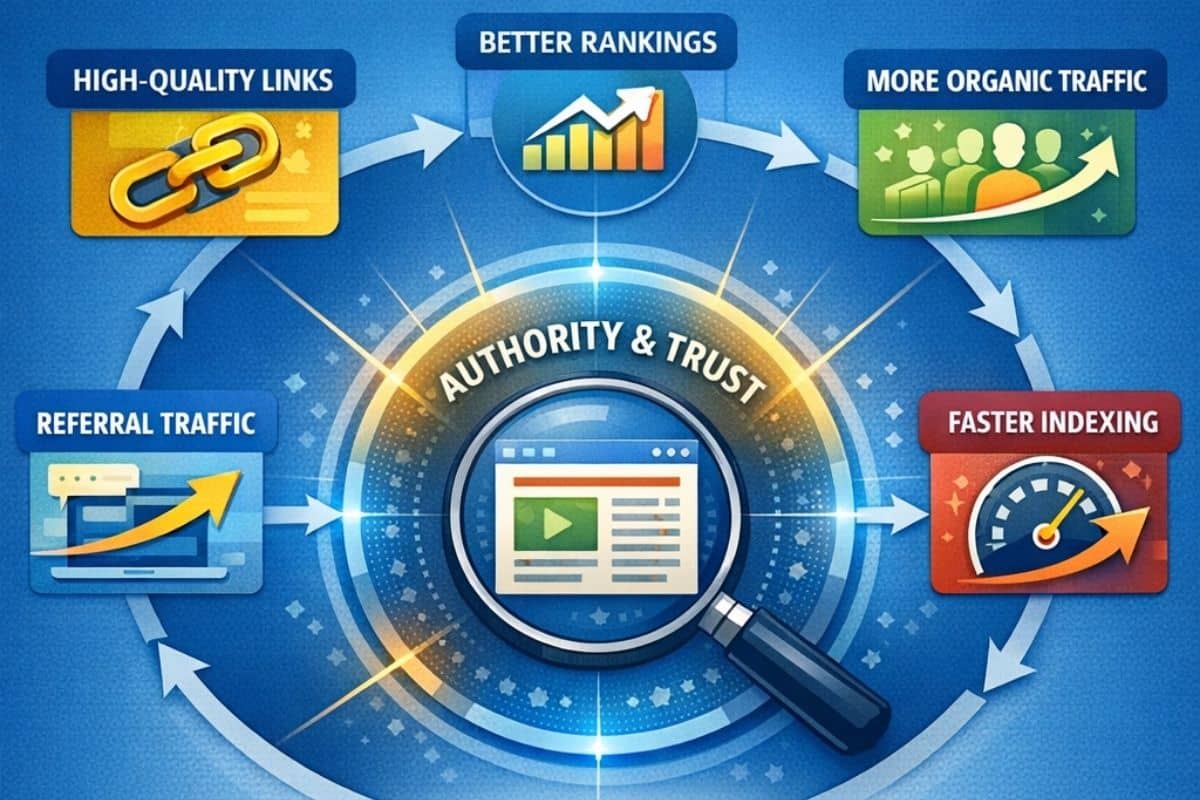Backlinks are commonly mentioned when talking about search engine optimization. What are they, and why are they so important that search engine optimization gurus cannot stop talking about them?
A backlink is a link from one site to another. In other words, a backlink is a vote of confidence from one site to another. Google interprets it as, “We think this other site has good, reliable content.” Because of this, Google tends to give sites with correct backlinks better rankings.
What Are SEO Backlinks?
What backlinks mean has already been defined above. The term backlinks in search engine optimization simply means that other sites link to you, and you get to improve your position in search engines. Backlinks can come from industry blogs, news sites, social media profiles, directories, other search engines, etc. However, not all backlinks are created equal
Backlinks from reputable sources, like an established industry or a well-known news site, will help your SEO a lot more than a random blog post. This is why the best backlinks for SEO are mostly based on quality, not quantity.

Let’s say you wrote a comprehensive guide on how to plan healthy meals, and a well-known fitness site with good domain authority linked to your guide in one of their nutrition articles. That’s considered a good backlink, and it shows Google that your content is worthy of being promoted in their results.
When an article from another site links to your site, it’s like they’re telling Google, “Hey, this page is useful and trustworthy.”
Why Are Backlinks Important in SEO?
To understand why backlinks are important in SEO, you need to consider how search engines see content. Google has a particular way of evaluating a page’s search results, and backlinks are a big part of it. Google will see your content as more valuable based on how many reputable sites are linking to it. Consequently, your site will gain more authority.
So, how exactly do backlinks benefit SEO? Here are some of the benefits:
- Better Rankings: Backlinks will affect how you rank in the search engines. The more backlinks you have, the better.
- Increased Organic Traffic: Better Rankings mean more visitors are able to find your content.
- Quicker Indexing: Pages with more backlinks are discovered and indexed faster by search engines.
- Improved Authority: Pages with backlinks are considered more authoritative.
- Referral Traffic: If someone clicks on the link, you will get referral traffic.
- Outranking the Competition: A strong backlink profile will lead you to outrank the competition.

Copying great content, or more usually creating great content, is necessary but not sufficient. Backlinks are one of the most important elements of great SEO. Without them content will be stuck on page 5, 6, or worse.
Different Types of Backlinks in SEO
Not all ts and backlinks in SEO are created equal. Some will help your site, some will hurt your SEO, and some will do nothing.
- Backlinks of DoFollow type are the most valued. Such backlinks transmit authority (often called “link juice”) to your page. DoFollow links from high-authority websites are extremely important for improving your ranking. In any backlinking strategy, these are the most important links to get.
- NoFollow backlinks have a tag that tells search engines not to follow them and not to pass authority. Although they do not improve your ranking directly, they are not worthless. They can generate traffic referrals and add to a diversity of links, which Google appreciates, even if the links are not intended to positively impact the ranking.
- When a backlink is in the relevant content itself, not in footers or sidebars, it is called a contextual backlink. Google appreciates these kinds of backlinks because they show authentic editorial support. When your backlink is embedded in an article that talks about a topic that is relevant to your content, it gives your website a comparatively higher value score.
- When a journalist, blogger, or content creator references your work because it was valuable enough, it is called an Editorial Link. Those are the best type of backlinks.
- A Guest post backlink is a backlink that comes from posts you create for other websites. If done correctly and with quality content for relevant websites, it can be very good for building authority.
- Toxic or Spammy Links come from low-quality, irrelevant, or suspicious sources. These can damage your SEO and result in Google penalties. This is why the best SEO backlinks are not just plentiful. They are important, organically obtained, and from reputable sources in your niche.
How Do Backlinks Work for SEO?
How do backlinks work for SEO from a technical standpoint? When Google’s crawlers identify a link to your site, they analyze the referring site’s authority, relevance to the content, the anchor text, and the position of the link. They determine how much “link equity” goes to your page based on these factors.
Think of it in terms of academic citations. A research paper is recognized as more credible the more it is cited in well-known publications. In the same way, your website becomes more credible the more it is cited on reputable and trusted websites. Google recognizes this and uses it to determine which pages to rank higher. This is the essence of backlinking for SEO.
How To Build a Backlinking Strategy?
A successful SEO backlink strategy is based on doing the right thing, avoiding the use of tricks or deceit. It is based on the creation of content that people really appreciate and want to share links for.
Say, for example, you write a high-quality data-driven guide about an industry problem. That guide will be mentioned by other people in their articles. Just one of those high-quality links can outperform dozens of average links in terms of impact on rankings.
Some elements of an effective SEO strategy that focuses on backlinks include:
- Outstanding content: Produce guides so good that other people will want to link to them. These can be other original research, custom tools, studies, or expert round-up guides.
- Outreach: Build relationships with other webmasters, bloggers, and editors, and explain to them why your content should get a link. This takes a lot of work and dedication, but over time, you will get valuable backlinks.
- Getting into resource listings: Find editors of resource pages that list tools and services in your niche, and get yourself added to the quality link list.
- Digital PR. Get mentioned in articles, blogs, or journals about your industry by providing them with newsworthy content, expert quotes, or original research.
- Broken link building: When you find broken links on relevant sites, suggest your content to fill their broken link.
The goal of all of these strategies is the same: to get backlinks that are valuable to real people looking for information, as well as to Google or other search engines.

New and valuable content gets better rankings and gets more chances of natural backlinks
Good backlink building for SEO begins with sustainable link building, which means no tricks and no schemes. Start by creating and offering something of value.
How do you get organic SEO backlinks that do not disappear? Tackle the questions that are frequently asked in your niche. For example, if you wrote a definitive guide explaining “What are SEO backlinks, and how do they impact rankings?”, you have a high chance of attracting backlinks from websites aiming to cover similar topics.
Here are proven strategies to earn quality backlinks:
- Creating Linkable Assets: Not every piece of content has the potential to attract backlinks naturally. You can increase the likelihood of this by creating high-quality, linkable asset content, such as original research, detailed and annotated case studies with lots of data, infographics that explain and visualize complex topics in your industry, and industry reports. You can also create detailed summaries of your content and share them as downloadable PDFs, free tools, calculators, or quizzes.
- Leveraging Mentions: When you mention a piece of content, a tool, an industry expert, or a company in your blogs, make sure you notify them. Many of them will share and link to your content, thus giving you an opportunity to earn a backlink.
- Keeping Your Content Fresh: Regularly updating your best-performing content to include the most recent data, new examples, and new insights will help you get backlinks. Fresh, new content is prioritized when content is being ranked and will attract more backlinks than content that is outdated.
- Build genuine relationships: Foster genuine connections with your industry community using social media, community forums, and events. These real relationships create rapport that can lead to linking opportunities.
- Guest contribution: Author insightful guest posts for authoritative industry-related websites and include one contextual backlink to relevant content on your site.
- Competitor backlink analysis: Analyze how your top competitors acquire links, and then pursue comparable opportunities with content that is superior to theirs.
These strategies prioritize earning links organically, as opposed to risking penalties in pursuit of quick fixes. Same as Indexed Zone SEO approaches, SEO backlink construction—through sustainable, white-hat strategies that produce long-term outcomes.
Why Backlinks Remain a Critical SEO Ranking Factor
The Relative importance of a backlink gives a metric to determine the strength of backlinks. For example, Link Building gets a good score compared to a lot of other SEO techniques.
Backlinks show value. When a bunch of authority sites link to a page, Google understands the page is legit. If a page is linked to from trustworthy sites, Google knows the page is useful.
Google is smart, so creating links, even if they are bad, just to get many links is unproductive. Google is intelligent enough to find bad link schemes, low-quality links, and bad linking patterns. That’s why clean and honest SEO is always the right way to get backlinks.
Focus on creating the relevant links to Google’s algorithms.
Even amazing content will get nowhere if there are no backlinks.

Final Thought: Backlinks are extremely important.
Backlinks are like digital approvals. When authority sites link to you, they are telling Google your content must be valuable. That’s why there is still importance placed on backlinks.
Gaining backlinks is more likely to yield better results than other improvements in SEO if you target certain backlinks. Improving visibility, increasing traffic, and increasing domain authority all suggest that more backlinks can be earned over time. Keep in mind that query relevance and site trust are both crucial.



